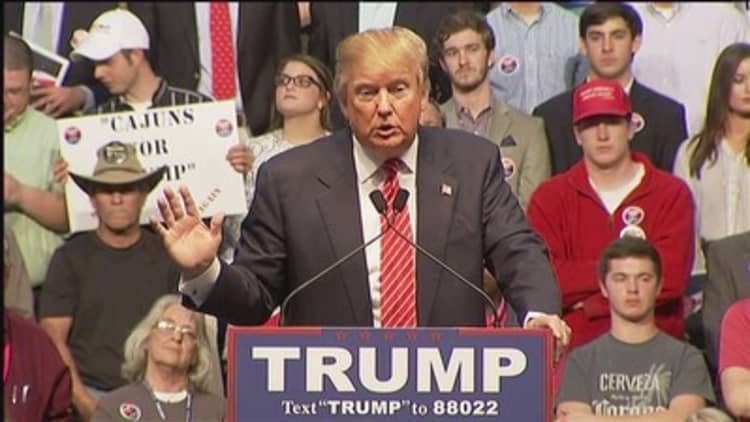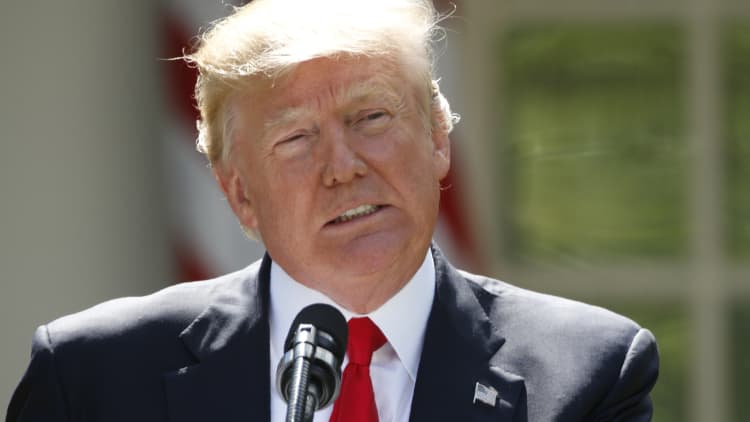
Before and after winning the White House, President Donald Trump promised a bevy of achievements for his time in office.
Trump has gotten some key wins — and gives himself extremely high marks for his first months in office. But the president has faced setbacks and delays on some of his signature policy proposals. He has also been dogged by a probe into his campaign — and a reported more recent investigation into him personally.
While Trump has by some measures had a rough time adapting to the office, the first few months have not been all bad for him. Here is a summary of what Trump has — or hasn't — done so far to follow through on the major promises he made.
Creating a jobs boom
Trump won the White House promising an American economic boom and jobs for displaced workers in the Rust Belt, pockets of the country that helped to fuel his electoral win. He pledged to create 25 million jobs over a decade, while his administration has repeatedly said it wants to achieve at least 3 percent sustained annual gross domestic product growth.
The Trump administration has repeatedly touted corporate hiring or investment announcements as evidence that the president's agenda is working but job and GDP growth have barely changed since he took office. The first five months of 2017 saw average nonfarm payroll growth of 162,000 — slightly lower than the average job creation rate of about 187,000 a month in 2016. The pace is below what would be needed to create 25 million jobs over a decade.
On Thursday, the Commerce Department gave a revised reading of 1.4 percent GDP growth for the first quarter, again not a major shift from the previous administration.
It may be too early to assess Trump's effect on the economy only five months into his term. The Trump administration has also said that some policies it has not yet implemented — like tax reform — would drive economic growth.
Repealing and replacing Obamacare
Shortly before he won the election, Trump promised a special session of Congress on Day One to repeal and replace the Affordable Care Act, his predecessor President Barack Obama's signature achievement better known as Obamacare. Five months in, Republicans are still struggling to reach a deal on the best way to replace the law.
After a first version of their replacement plan failed in March, House Republicans narrowly passed a widely unpopular health-care bill in May. The Senate GOP has failed to reach a consensus on its own, largely similar and still unpopular, Obamacare replacement, facing opposition from both its moderate and conservative wings. Senate Majority Leader Mitch McConnell hoped to pass a bill this week, but delayed the vote as support faltered.
The Senate GOP now wants to pass it before its August recess.
Trump separately promised that his health-care plan would be "insurance for everybody." A Congressional Budget Office estimate says the Senate plan would lead to 22 million more uninsured Americans by 2026.
He also said he would not cut Medicaid, the health-care program that covers the poor.
While Medicaid spending technically still increases under the Senate plan, it would fall by 35 percent relative to current law by 2036, according to the CBO.
Obamacare remains in place, for now.
Reforming the U.S. tax system
Trump has promised an overhaul of the American tax system that includes the "biggest tax cut" in American history. His administration wants to slash the corporate tax rate to 15 percent and chop income tax rates across the board, reducing income tax brackets from seven to three.
The White House and congressional Republicans have set a deadline of this year to pass a tax reform bill. Treasury Secretary Steven Mnuchin previously gave an August goal, but delays in the Obamacare replacement process forced him to back off.
So far, the Trump administration has outlined only a one-page summary of its tax reform priorities. The White House has been meeting with congressional leaders to hash out a combined plan that they hope can start working its way through Congress following the August recess.
Passing tax reform will wait until at least the fall.
Overhauling American infrastructure
Trump pledged a $1 trillion injection to fix American bridges, roads and airports. So far, it has taken a backseat to health care and tax reform.
Transportation Secretary Elaine Chao has said it will feature $200 billion in public spending, with the rest coming from private investment, over 10 years. Details have been scant, beyond that.
Trump has also encouraged Congress to privatize the nation's air traffic control system, though he has taken no concrete action on that front yet.
Any congressional action on infrastructure likely would not come until next year.
Slashing regulations
Trump came into office promising to scale back regulations, saying the moves would help to boost economic growth and energy jobs, in particular. Easily the most Trump administration action has related to efforts to undo Obama-era regulations.
Trump has signed various congressional review acts designed to roll back environmental regulations imposed on oil, gas and coal companies, while signing executive orders aimed at undoing rules Obama created to fight climate change. Some of those measures have been largely symbolic.
Among various other moves, he has signed an executive order with the goal of executive branch agencies revoking two regulations for every new one put forward. He also dropped Obama-era regulations that imposed restrictions on coal-related emissions and dumping.
Trump also followed through on a pledge to withdraw from the landmark Paris climate accords, despite opposition from some parts of his administration and most major American companies.
It's questionable whether rolling back regulations will unleash a boom in production or jobs. While energy companies often advocate publicly for deregulation, 13 of the 15 biggest U.S. oil and gas producers told their investors that current regulations have little impact on their operations, Reuters reported in March.
Michael Cohen, Barclays head of energy commodities research, told CNBC on Thursday that Obama-era regulations "didn't really inhibit this dramatic increase in energy production that we saw."
The Trump administration has repeatedly touted that its actions have created coal jobs, but it is unclear if those positions actually exist.
Cracking down on immigration
Trump pledged to take various actions on immigration that he argued would boost national security and aid American workers. Trump promised to build a physical wall on the U.S.-Mexico border and make Mexico pay for it, deport criminal undocumented immigrants, triple the number of Immigration and Customs Enforcement agents and terminate Obama-era protections for undocumented immigrants who came to the U.S. as children.
Congress has shown a reluctance to fully fund the border barrier, while Mexico has said unequivocally that it will not pay for the wall.
Through executive orders, Trump has pushed to stop funding for so-called sanctuary cities, and ordered the Department of Homeland Security to hire more immigration officers. He has also publicly supported two bills that passed the House on Thursday: one that would increase the punishment on undocumented immigrants who try to re-enter the country after getting deported for crimes and another that would cut funds from sanctuary cities.
It is unclear if those bills will pass the Senate and make it to Trump's desk.
Trump has also at least temporarily backed off his pledge to end the protections for the undocumented immigrants who came to the U.S. as children.
Reforming trade
Trump promised to renegotiate trade deals and push back against trade practices that he said punished American manufacturing workers.
The president withdrew from the Trans-Pacific Partnership, the Pacific trade deal backed by the Obama administration. It would not have received congressional approval, even if the Trump administration had supported it.
His administration has also taken the formal steps to start renegotiating the North American Free Trade Agreement, the deal among the United States, Canada and Mexico. The actual renegotiation of the deal may not take place until late this year or early next year.
The Trump administration has announced various actions against Canada and other trading partners, and he is reportedly considering tariffs on steel imports.
Some critics have warned that Trump's tactics could lead to a trade war or other effects that could damage the U.S. economy or harm consumers.
Travel ban
As a candidate, Trump called for a "total and complete shutdown" on Muslims entering the United States in response to terrorism concerns. The divisive and potentially unconstitutional proposal gradually evolved.
Trump signed an executive order in January temporarily restricting travel from seven Muslim-majority countries, arguing it would prevent attacks on U.S. soil. That controversial "travel ban," which prompted confusion at airports nationwide, was eventually revised and again suspended in the courts.
However, when the Supreme Court said this week it would hear the Trump administration's challenges to rulings blocking the order, it said it would temporarily allow enforcement of parts of the travel ban in what was seen as a win for Trump.
The U.S. has started to enforce it, at least until the Supreme Court hears the case this fall.
Nominating a conservative Supreme Court justice
As a candidate, Trump promised that he would nominate a conservative Supreme Court justice to succeed the late Antonin Scalia. He nominated 49-year-old Neil Gorsuch, who the Senate confirmed in April after having to change its rules to overcome a Democratic filibuster.
Gorsuch has so far proven reliably conservative on the nation's top court.
Boosting military spending
Trump repeatedly called for more funding to refresh what he called a stagnant American military.
The spending bill he signed to fund the government through Sept. 30 includes $15 billion toward his planned military buildup.
WATCH: Trump takes another swipe at Amazon, says Jeff Bezos doesn't pay 'internet taxes'



